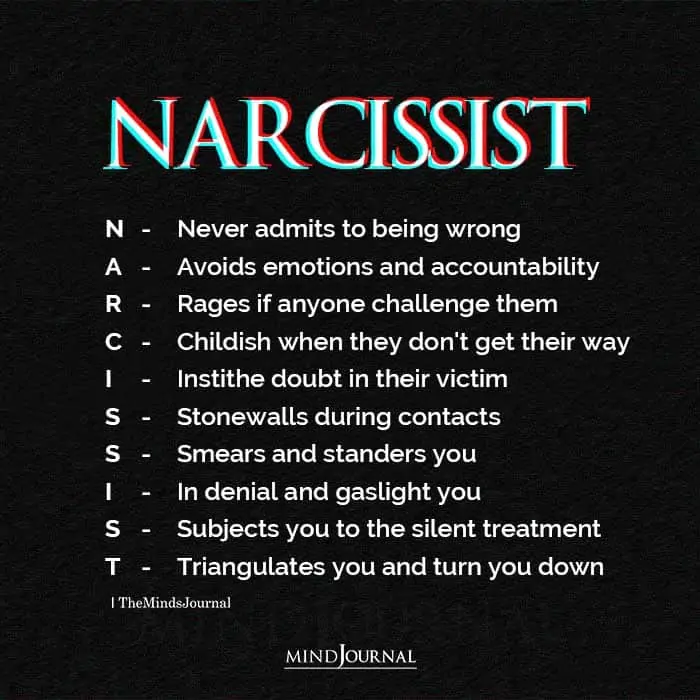Are you dealing with a narcissist or sociopath? If you’re in an abusive relationship, you may wonder if your partner is a sociopath or narcissist and whether or not the relationship will improve.
If so, or if you recently ended such a relationship, it can undermine your self-esteem and ability to trust yourself and others.
The labels sociopath and psychopath have often been used interchangeably; however, sociopathy is correctly referred to “Anti-Social Personality Disorder“. (APD) Unlike mood disorders, which fluctuate, personality disorders, including APD and Narcissistic Personality Disorder (NPD), are enduring, pervasive – affecting a wide range of situations, and are difficult to treat. Signs may be evident by adolescence, but a diagnosis isn’t made until adulthood.
Are You Dealing With A Narcissist?
Diagnosis of Anti-Social Personality Disorder
To qualify for a diagnosis of APD, the patient must have had a conduct disorder by 15 years old, and show at least four of these traits:
- Doesn’t sustain consistent work (or school)
- Doesn’t conform to social norms, including unlawful behavior whether or not arrested
- Disregards the truth, indicated by repeated lying, conning, using aliases, not paying debts
- Impulsive or fails to plan ahead; moves around without a goal
- Irritable and aggressive; e.g., fights or assaults
- Recklessly disregards safety of self or others
- Consistently irresponsible, as indicated by repeated failure to sustain consistent work behavior or honor financial obligations
- Lacks remorse, and feels justified in having hurt, mistreated, or stolen from another
- Doesn’t sustain monogamy for more than one year
- Irresponsible and negligent as a parent
Types of Narcissists – Malignant and Closet Narcissist
Some narcissists can look like sociopaths, but there are narcissists who aren’t malicious and who care about their families. Those who have all or most of the 9 criteria for a diagnosis of NPD (only five are necessary), and who exhibit them intensely and/or frequently, are considered malignant narcissists. They’re more exploitative, vicious, and destructive.
There are several types of narcissists – ranging from the common “Exhibitionist Narcissist” to the inhibited or “Closet Narcissist,” coined by psychoanalyst James Masterson. They may have an inferior self-image and show evidence of depression and emptiness, which the exhibitionist narcissist also has but hides, (also from him or herself).

Read: 6 Feelings That Sociopaths and Narcissists Leave Behind
Rather than seek attention, the closet narcissist may shun it and even act humble. Like codependents, they are uplifted through the idealization of others. Contrary to some popular beliefs, this does not make codependents closet narcissists. The latter still lack real empathy and believe in their specialness and sense of entitlement, even in their martyrdom.
Are you dealing with a narcissist or sociopath? In order to gain clarity, you must first understand the similarities and differences between sociopaths and narcissists.
Comparing Sociopaths and Narcissists
Both sociopaths and malignant narcissists can be charming, intelligent, seductive, and successful. They share similar traits of being unreliable, self-centered, insincere, dishonest, and needing control.
Both malignant narcissists and people with APD have an inflated view of themselves and sense of entitlement. Even when they’re abusive, they believe they’re justified and deny responsibility for their behavior. They lack insight, empathy, and emotional responsiveness. Although they might feign appropriate emotional reactions, this is a learned behavior and not sincerely felt.
Narcissists who have fewer and less severe symptoms, along with “narcissistic” people who don’t have full-blown NPD, can have insight, guilt, remorse, and an ability to emotionally connect, as well as love. (See Dealing with a Narcissist: 8 Steps to Raise Self-Esteem and Set Limits with Difficult People to determine if your loved one is capable of change and whether your relationship can improve.)
Read : 3 Mental States That Narcissists and Sociopaths Manipulate in Others
Differences between Sociopaths and Narcissists
While sociopaths qualify as narcissists, not all narcissists are sociopaths. What drives them differs. But the main distinction is that a sociopath is more cunning and manipulative because their ego isn’t always at stake. In fact, they don’t have any real personality.
They’re the ultimate con artists and can take on any persona that suits them. Thus, they may be harder to spot, because they’re not trying to impress you or win your approval – unless it serves their agenda. Instead of bragging, their conversation might center on you rather than on themselves, and they can even be self-effacing and apologetic if it serves their goal.
Like premeditated killers, a sociopath is more calculating and might plot and plan an attack month in advance; whereas, a narcissist is more likely to react sooner, using intimidation and lies. Sociopaths are lazier and try to swindle, steal, or exploit others financially, while many narcissists though exploitative, work hard to achieve their aims or perfection.
Although both characters may be motivated to win at all costs, narcissists are more interested in what you think of them. They need others’ admiration. This makes them dependent and codependent on others, and actually capable of being manipulated. They’re less likely to divorce their spouse than a sociopath, who might leave or vanish if they’re exposed or don’t get what they want.
Read : 6 Diversion Tactics Used By Sociopaths, Narcissists and Psychopaths to Manipulate You Into Silence
Are You Dealing With A Narcissist? Help and Treatment
You cannot change another person, but changing your behavior will change the relationship. You need support to restore trust in yourself and others that become damaged in an abusive relationship. Find help to set boundaries and raise your self-esteem.
People with NPD or APD don’t usually seek treatment, unless, in the case of NPD, they’re experiencing severe stress, depression, or their partner insists. Those with APD are sometimes unwillingly court-ordered to therapy, which in itself becomes a hurdle to overcome in terms of trust and receptivity. Therapy should focus on helping them access their feelings and learn from the negative consequences of their behavior.
Are you dealing with a narcissist? Then please know that many narcissists can improve with treatment, and those who have insight can benefit from psychodynamic psychotherapy.
Read : 9 Ways to Identify that Sociopath, Psychopath, or Narcissist in your life
Everyone is unique, and people don’t always fit neatly into defined categories. Severe NPD resembles APD, and any differences are really irrelevant. Don’t be concerned with diagnosing; instead, put your energy into healing yourself from trauma or PTSD and codependency.
Become assertive and set limits. If you’re in an abusive relationship, seek help immediately. Neither staying nor leaving is easy. Focus on gaining awareness, protecting yourself, and getting help and support.
Follow the steps in Dealing with a Narcissist to raise your self-esteem set boundaries and evaluate the prospects for improving your relationship. When you argue and fight with an abuser, you lose. But that doesn’t mean that you don’t confront what is going on. However, you need to do so calmly and strategically. Change and a better life are definitely possible.
©Darlene Lancer 2018
Are you dealing with a narcissist or sociopath? Let us know in comments below
Written by Darlene Lancer JD, MFT
Republished with permission.
Frequently Asked Questions (FAQs)
Is it common for a sociopath to physically emotionally and psychologically abuse their partner and then blame the partner for their abusive actions?
Most sociopaths can willingly admit to harming others emotionally, physically, or financially. They may feel remorse but if a person is a psychopath, they will blame others for their actions.
Can a narcissist also be a victim?
Narcissists tend to be manipulative people who will often play the victim card. But in severe cases they can also experience abuse and violence.
What is worse, a narcissist or a sociopath?
A sociopath will act regardless of how others perceive them, whereas narcissists, require praise, admiration and are deeply concerned with the impact they make on others.










Leave a Reply
You must be logged in to post a comment.